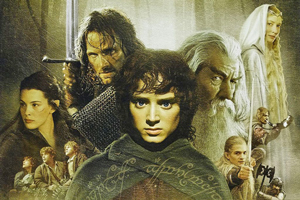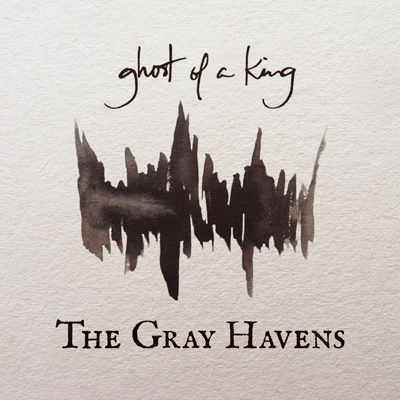When Dave Radford, one-half of the husband-wife pop-folk duo, The Gray Havens, summoned producer Ben Shive (Colony House, Andrew Peterson) to the studio last year to pull the trigger on a new recording, the singing songwriter came armed with over 700 voice memos filled with melodic ideas, instrumental thoughts and lyrical blueprints to round out a record.
Sound a bit chaotic? Perhaps. But when the studio pair stumbled across a memo of Dave singing three words, “Met a ghost …” over a haunting acoustic guitar riff, Radford and Shive knew they had just found a keeper. And so the title track for the group’s second full-length project, Ghost Of A King (Artist Garden Entertainment), was born, compiling a complete ten-track recording from one mysterious phrase, and instantly propelling the couple into the Top 5 of iTunes’ mainstream Singer-Songwriter chart upon the album’s release.
Reflecting a deep maturation in Dave and Licia’s already-acclaimed musicianship, Ghost Of A King also ups the ante lyrically, showcasing the matrimonial musicians’ literary flair to poetically explore humanity’s perpetual pining for love, home and God. So in an effort to further reveal the minds and hearts behind the music, we sit down with Dave Radford for an intimate one-on-one about literature, longing and the allusive meaning behind the name, The Gray Havens.
 CCM Magazine: For those that may be unfamiliar with your music, The Gray Havens’ name is an allusion to Tolkien, correct?
CCM Magazine: For those that may be unfamiliar with your music, The Gray Havens’ name is an allusion to Tolkien, correct?
Dave Radford: Correct you are. We were on a deadline to print our first CD and didn’t have a band name. We decided to send out a message to our Kickstarter backers titled, “We need a band name!” We told them we liked The Lord Of The Rings and Narnia, and threw out a few key words that we’d be playing with.
We were happily surprised by the level of response. Some comical. Some serious. Some neither. I received an email from a backer whose son-in-law had come up with a few ideas for a name. Among them was, “The Gray Havens.” It is a chapter title from the last installment of the Lord Of The Rings trilogy. In the book, it represented a seaport from which characters sail to the undying lands.
It would be hard to overstate Tolkein’s influence and value [on us] (C.S. Lewis could easily be thrown in here as well). The imagination, attention to detail, and authenticity of the world portrayed in Lord Of The Rings is incredible.
Tolkien is also an encouragement for us in the way he regarded music. He expressed a hierarchy for the ways we communicate. At the bottom was analytical speech. Higher than that was math, which took its place underneath prose. Climb a little higher and you’ve reached poetry. At the top, he argued that music was the highest mode of communication. Pretty cool.
CCM: How is the meaning of your moniker reflected through your songs, especially on Ghost Of A King?
DR: We want to take our listeners on a journey, so I thought it totally fitting when our bio writer, Mark Geil, described it this way: “If Tolkien’s seaport (the Grey Havens) is a launching point from which the traveler sails toward a distant holy shore, then Ghost Of A King is traveling music. This collection of expressive songs speak wisdom into the here and now even while they cast a watchful eye toward the holy shore.” He’s a far better writer than me, so I’ll just go with that answer.
CCM: Throughout the track listing, I sense a theme of longing. Is this true?
DR: Definitely. The first track, “Ghost In The Valley,” is a sort of a testimony and a prelude to the record, which describes our ultimate longing being met and fulfilled in the Son of God, the River of Life who calls us to live a life of abundance. After this, the lyrics dip in and out of other types of longing, whether that be following the Lord, loving my spouse well, or the desire to spend eternity with my non-believing friends and siblings.
CCM: I’ve read literature has a significant impact on your songwriting as well. How so?
DR: I believe story and metaphor have superpowers that are absent in non-fiction writing, which is probably why I lean more heavily toward a more “storyteller” disposition in writing. But I’ve also been incredibly influenced by many non-fictional works. Non-fiction taught me “what” to say and fiction taught me “how” to say it.
CCM: Any works in particular?
DR: I’m a fan of great writing, and a sucker for a good story. My favorite fictional books are Lord Of The Rings, The Chronicles Of Narnia and Harry Potter. More recently, I enjoyed reading a book called Shantaram and The Name Of The Wind. Both of these I would recommend only to college age and above.
In more recent years, my favorite non-fiction books have been The Cross Of Christ by Jon Stott, Prodigal God by Tim Keller and The Things Of Earth by Joe Rigney. I’m currently reading The Whole Christ: Legalism, Antinomianism, and Gospel Assurance… by Sinclair Ferguson and loving it, and plan on reading One With Christ: An Evangelical Theology of Salvation by Marcus Johnson after Licia finishes it.
CCM: Listening through Ghost, it is apparent you have significantly grown in your poetic sensibilities. You also have had a lot of personal growth, including a move to Nashville and the birth of your first son, Simon. Is there a correspondence between the two?
DR: Thank you very much for saying so. I actually don’t think it had much to do with Simon being born, other than the downtime it afforded me to focus on writing. This is also the first record that doesn’t have a significant amount of songs that were written during my college years. I think that definitely made a difference.
I also had a much better team around me this time. My wife Licia, our manager, and our producer all had a very active voice in the shape of each song. The general process for writing each song would look like me disappearing into the least messy room in our cramped apartment, writing for an hour or two, and emerging to play for Licia what I’d written. If the song was good enough to make it beyond her approval—which is not an easy stage to pass through [laughs]—I’d upload the voice memo to a Dropbox folder for our manager and Ben Shive to listen to. They would then offer their comments before I headed back to into the room, that by now was much messier with pages of crumpled paper strewn everywhere, and make the edits.

CCM: Speaking of the music, the haunting, almost hip-hop programmed beats of the title track also exhibit a broader maturity since past projects. What do you attribute the growth to?
DR: Ben Shive certainly deserves a lot of credit here. He has this gift for coming up with creative hooks that happen at exactly the right moments using exactly the right sounds, all while carrying on a pleasant conversation and drinking a chai tea. He’s a sort of ninja, and not to be trifled with. [Laughs]
In all seriousness, I think we were a great team. The ideas seemed to flow. That’s not to say every bit of it was easy. There were many late, late nights, occasional walks outside to find inspiration, and moments when we would just stare at each other while trying to come up with the perfect lyrics, tossing out would-be phrases across the table at [our favorite burger joint] followed by, “No, that’s stupid, forget it.”
But outside of the songwriting portion I talked about before, I attribute so much of the record’s “success” to Ben’s being a ninja.
CCM: At the end of the night, whether you are performing in a church, a coffee shop, a theater or a bar, what is it you want listeners to take away from a Gray Havens listening experience?
DR: Our goal by the end of the night is to awaken wonder and joy for the Lord and His glory through song, both in our selves and in our listeners. If we’ve done that, we did it right.



Leave a Reply
You must be logged in to post a comment.